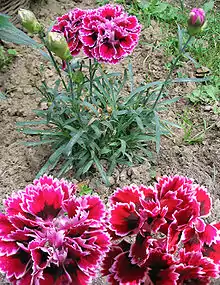carnation
English

A carnation cultivar
Etymology
From Middle French carnation (“person's color or complexion”).
Pronunciation
Noun
carnation (countable and uncountable, plural carnations)
- (botany) A type of Eurasian plant widely cultivated for its flowers.
- originally, Dianthus caryophyllus
- other members of genus Dianthus and hybrids
- The type of flower they bear, originally flesh-coloured, but since hybridizing found in a variety of colours.
- A rosy pink colour
- carnation:
- 1851, Herman Melville, Moby Dick, Chapter 6:
- And the women of New Bedford, they bloom like their own red roses. But roses only bloom in summer; whereas the fine carnation of their cheeks is perennial as sunlight in the seventh heavens.
- (archaic) The pinkish colors used in art to render human face and flesh
- carnation:
- A scarlet colour.
Synonyms
- (plant, flower): clove pink (also called gillyflower), (ancestor of the carnation) Dianthus caryophyllus
- (plant, flower): cottage pink, Dianthus plumarius
Derived terms
Related terms
Translations
plant
|
flower
|
rosy pink colour
- The translations below need to be checked and inserted above into the appropriate translation tables. See instructions at Wiktionary:Entry layout § Translations.
Translations to be checked
|
Adjective
carnation (not comparable)
Translations
colour
- The translations below need to be checked and inserted above into the appropriate translation tables. See instructions at Wiktionary:Entry layout § Translations.
See also
- (reds) red; blood red, brick red, burgundy, cardinal, carmine, carnation, cerise, cherry, cherry red, Chinese red, cinnabar, claret, crimson, damask, fire brick, fire engine red, flame, flamingo, fuchsia, garnet, geranium, gules, hot pink, incarnadine, Indian red, magenta, maroon, misty rose, nacarat, oxblood, pillar-box red, pink, Pompeian red, poppy, raspberry, red violet, rose, rouge, ruby, ruddy, salmon, sanguine, scarlet, shocking pink, stammel, strawberry, Turkey red, Venetian red, vermilion, vinaceous, vinous, violet red, wine (Category: en:Reds)
- gypsophila
French
Etymology
From Middle French, possibly from Italian carnagione (“flesh color”), either way from Late Latin carnātiōnem (“fleshiness”) (from Latin carō (“flesh”)), or from a corruption of coronation (from Latin corōnāre (“to crown”), from corōna (“crown”)), because of the flower's use in chaplets or from the toothed crown-like look of the petals.
Pronunciation
- IPA(key): /kaʁ.na.sjɔ̃/
Audio (file)
Noun
carnation f (countable and uncountable, plural carnations)
Further reading
- “carnation”, in Trésor de la langue française informatisé [Digitized Treasury of the French Language], 2012.
This article is issued from Wiktionary. The text is licensed under Creative Commons - Attribution - Sharealike. Additional terms may apply for the media files.